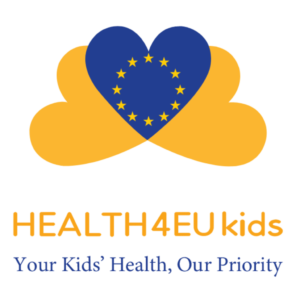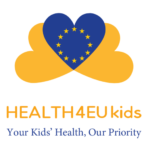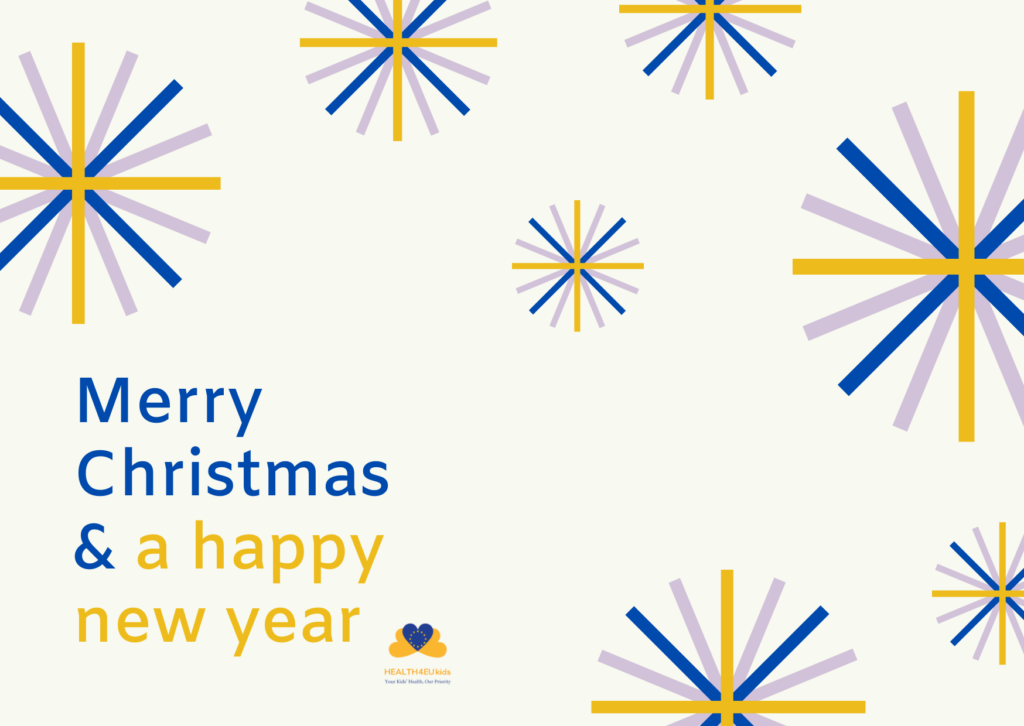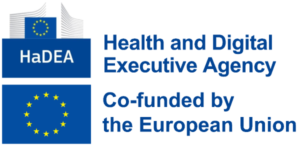
Project number: | 101082462 |
Project Acronym: | Health4EUkids |
Project Name: | Joint Action for the implementation of best practices and research results on Healthy Lifestyle for the health promotion and prevention of non-communicable diseases and risk factor |
Granting authority: | European Health and Digital Executive Agency |
Starting Date: | 01/12/2022 |
Duration: | 36 months |
Coordinator: | 6th Health ADM |
”Health4EUkids aims at the implementation to a broader level and a number of European countries in the field of health promotion and prevention of non-communicable diseases, indicating best practices and specific risk factors from research results on child obesity that have already developed from previous research actions.
The overall goal of the JA is to implement two best practices Grunau Moves established in Germany and Smart Family established in Finland in different MS. The implementation process will include the knowledge transfer between best practice owners (Smart Family and Grunau Moves) and partner organisations from the Member States through the implementation of actions, the cooperation and exchange of knowledge between member states, the organisation of meetings, and related technical support. Also important part of the project is to produce policy developments to foster public health investments at community level in each country member on Health Promotion, Disease Prevention and Management of Non-Communicable Diseases.
Scope of the project will be to promote to participating member states healthy lifestyles in families with children to prevent childhood obesity, to increase physical activity and healthy diet in children, families and communities with a focus on social norms, recognition and self-esteem in deprived districts in member states. Also, to study the different prerequisites for member states by implementing either Grunau Moves or Smart Family. Finally, to prepare the sustainability of these best practices and transfer to other member states based on the acquired knowledge and experience.
The “Health4EUkids” specific objectives are to:
1.Increase data and survey the requirements and prerequisite for each Member State to implement proposed best practices
2.To strengthen a cooperative approach in tackling childhood obesity by facilitating the exchange of knowledge and learning skills among Member States and the best practice providers;
3.To select and implement actions according two best practices Grunau moves and Smart life that provide the best opportunity to tackle childhood obesity among participating Member States;
4.To improve the planning and development of the policies to tackle childhood obesity in MS at the European, national, regional and local level using either
of best practices;
5.To facilitate transferability and sustainability of Best Practices to member states
The expected results focus on the identification of concrete challenges in the prevention of non-communicable diseases and policy solutions in the form of best practices and innovative solutions for collective action between the Member States and the Commission, to tackle the main public health challenges.”
“The partnership is composed of 12 Countries (12 beneficiaries and 10 affiliated entities) from health sector and academia contributing with different background, expertise and know-how to achieve the project’s objectives.”
Participating Countries
| Country | Organization | Beneficiary / Affiliated Entity | |
| Greece |  | Dioikisi 6is Ygeionomikis Perifereias Peloponnisou Ionion Nyson Ipeirou kai Dytikis Elladas (6th Health ADM) | Beneficiary (COO) |
 | University of Patras, Medical School, Department of Public Health (UPAT) | Affiliated Entity | |
| Belgium |  | Sciensano | Beneficiary |
| Croatia |  | Hrvatski Zavod Za Javno Zdravstvo – Croatian Institute of Public Health (CIPH) | Beneficiary |
| Finland |  | Terveyden Ja Hyvinvoinnin Laitos – Finnish Institute for Health and Welfare (THL) | Beneficiary |
 | Suomen Sydänliitto (FHA) | Affiliated Entity | |
| Hungary |  | Nemzeti Nepegeszsegugyi Kozpont – National Public Health Institute (NΝΚ) | Beneficiary |
| Italy |  | Istituto Superiore di Sanità (ISS) | Beneficiary |
| Lithuania |  | Kauno Miesto Savivaldybes Visuomenes Sveikatos Biuras – Public Health Bureau of Kaunas municipality (KVSB) | Beneficiary |
| Malta |  | Health Promotion and Disease Prevention Unit – Ministry for Health (MFH) | Beneficiary |
| Poland |  | Narodowy Fundusz Zdrowia – National Health Fund (NFZ) | Beneficiary |
 | Slaski Uniwersytet Medyczny W Katowicach – Medical University of Silesia in Katowice (SUM) | Affiliated Entity | |
| Portugal |  | Ministério da Saúde da Repubica Portuguesa (Direção-Geral da Saúde – DGS/ Directorate-General of Health – DGS) | Beneficiary |
| Slovenia |  | Nacionalni Inštitut za Javno Zdravje (NIJZ) – National Institute of Public Health (NIPH) | Beneficiary |
| Spain |  | Fundación para el Fomento de la Investigación Sanitaria y Biomédica de la Comunitat Valenciana (Fisabio) | Beneficiary |
 | Andalusian School of Public Health – Escuela Andaluza de Salud Publica SA (EASP) | Affiliated Entity | |
 | Conselleria de Sanidade de Galicia (CSG) | Affiliated Entity | |
 | Kronikgune Health Services Research Institute | Affiliated Entity | |
 | Instituto de Salud Carlos III (ISCIII) | Affiliated Entity | |
 | Fundacion Instituto de Investigacion Marques de Valdecilla (IDIVAL) | Affiliated Entity | |
 | Fundacio Institut d’Investigacion Sanitaria Illes Balears (IdISBa) | Affiliated Entity | |
 | Servicio Andaluz de Salud (SAS) and Fundacion Publica Andaluza Progresso y Salud M.P. (FPS) | Affiliated Entities |
Associated partners
| Country | Organization |
| Germany | Ministry of Health of Germany |
| Greece | Ministry of Health of Greece |
Our Team
“General Assembly (GA): the governing body of this joint action, represented from all team members of each Member State on kick-off meeting, intermediate meetings and final meeting.
Steering Committee (SC): the delegated body of this joint action for scientific and technical coordination, consisted by the coordinator and WP leaders.
Scientific Advisory Board (SAB): consisted by at least three expert members from different European countries, not belonging to the consortium partners, and collaborating stakeholders or affiliated entities. Aims at the scientific quality of work conducted in the JA by suggesting re-orientation of specific tasks, methodologies and provide strategic advice by meeting every 6 months and review the scientific process.
Policy Advisory Board (PAB): consisted by representatives of governmental and/or research funding organisations with no affiliation with the consortium partners and collaborating stakeholders to contribute to optimal police relevance. There will be an open process to invite representatives from corresponding bodies in each country. The PAB will include two experts from each country in order to contribute to the revision of policy reports.
Governmental Advisory Board (GAB): consisted by two representatives of health ministries or other official health governmental oganisations of participant countries. Mainly contributes to optimal transferability and sustainability of the results of the implementation of best practices in partners and the preparation of guidelines for the best transferability to other European countries and provides policy guidelines in European level.”
 The “HEALTH4EUkids” Joint Action aims to implement health promotion and prevention strategies for child obesity across European countries. It seeks to share best practices and research findings, particularly focusing on the initiatives Grunau Moves from Germany and Smart Family from Finland. The project involves knowledge transfer, cooperation between member states, policy development, and the promotion of healthy lifestyles in families and communities. Its goal is to prevent childhood obesity, increase physical activity and healthy diet, and ensure the sustainability and transferability of successful practices to other member states.
The “HEALTH4EUkids” Joint Action aims to implement health promotion and prevention strategies for child obesity across European countries. It seeks to share best practices and research findings, particularly focusing on the initiatives Grunau Moves from Germany and Smart Family from Finland. The project involves knowledge transfer, cooperation between member states, policy development, and the promotion of healthy lifestyles in families and communities. Its goal is to prevent childhood obesity, increase physical activity and healthy diet, and ensure the sustainability and transferability of successful practices to other member states.
This project has received funding from the European Union’s EU4HEALTH Programme under the Grant Agreement no 101082462







